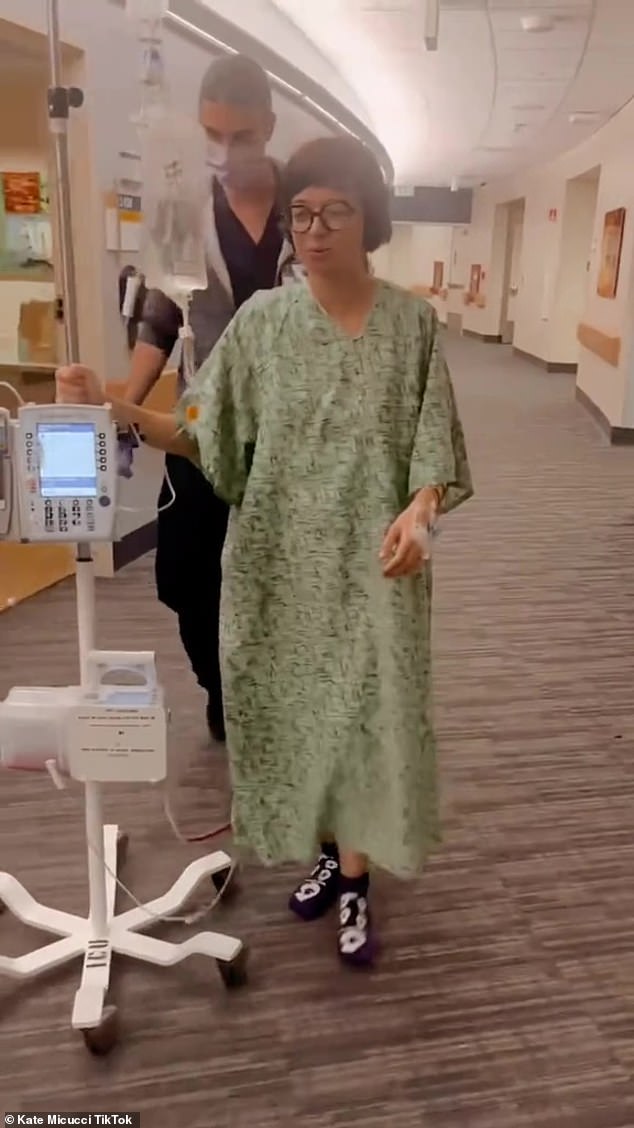The Big Bang Theory star Kate Micucci, 43, reveals she is lung cancer-free after successful surgery: ‘I am very lucky and I know that’
The Big Bang Theory star Kate Micucci has revealed she is cancer-free after successful surgery last week.
The actress, 43, who played Raj's love interest Lucy on the show in eight episodes between 2013 and 2017, revealed for the first time last week that she had lung cancer and said the diagnosis shocked her because she had “never smoked a cigarette in my life '.
On TikTok, the star said on Sunday that she felt “happy and grateful” after her successful operation.
She said, “Hey everyone! I just wanted to thank you all so much for the well wishes and all the love I have received this past week.
'It meant so much to me and really came at a time when I really needed it, so thank you.
The Big Bang Theory star Kate Micucci has revealed she is cancer-free after successful surgery last week

The star said she was now 'excited to hang out with my little boy at Christmas' and was seen affectionately kissing the three-year-old – who she shares with husband Jake Sinclair – at the end of the video
'I have great news, that I am cancer free! The operation last week went well. All reports came back that it worked, I don't need to do any other treatment.
'Thank you so much to all my doctors and nurses and everyone who took such good care of me. And thanks to figuring it out early, because I'm very lucky and I know it.
“I'm just very grateful that things turned out the way they did. I'm feeling really good today and I'm honestly so excited and really grateful. So thank you all for all the prayers and wishes. I'm just happy to tell you good news.'
The star said she was now 'excited to hang out with my little boy at Christmas' and was seen affectionately kissing the three-year-old – who she shares with husband Jake Sinclair – at the end of the video.
Last week Micucci took to TikTok to document her recovery after successful surgery to remove the disease.
As she lay in a hospital bed, hooked up to an IV, she said, “Hey everyone, this isn't a TikTok, it's a Sick Tok.
'I'm in hospital, but that's because I had lung cancer surgery yesterday. They noticed it very early.”
“It's really weird because I've never smoked a cigarette in my life, so it was a surprise, you know. But I also think it's happening and so the best news is that they caught it early, they got it out, and I'm fine.

She said: 'I have great news – I am cancer free! The operation last week went well. All reports came back that it worked, I don't need to do any other treatment'

The Big Bang Theory star Kate Micucci has revealed she has lung cancer.

The 43-year-old actress, who played Raj's (Kunal Nayyar) love interest Lucy on the show in eight episodes between 2013 and 2017, took to TikTok on Saturday to document her recovery after a successful surgery to remove the disease.
“It's been a bit of a journey and I'll probably take it easy for a few weeks, but then I'll get back into it.”
“Why am I still talking… because I'm on drugs!”
Revealing how she was first diagnosed, she said: 'I had one thing in my blood work that came back really high.
'So I went to a preventive doctor who did a few scans. He scanned my heart and noticed the spot in my lung.'
Lung cancer is the leading cause of cancer deaths in the US. It is detected using a low-dose computed tomography scan (CT scan).
One in six people will be diagnosed with lung cancer during their lifetime, and more than 127,000 lives are lost each year.
A recent report from the ACS shows that young women are more likely to suffer from lung cancer than men.
Men were almost twice as likely as women to develop the disease in the 1980s, due to higher rates of smoking and higher workplace exposure to substances such as asbestos.

As she lay in a hospital bed, hooked up to an IV, she said, “Hey everyone, this isn't a TikTok, it's a Sick Tok. 'I'm in hospital, but that's because I had lung cancer surgery yesterday. They noticed it very early.”

“It's really weird because I've never smoked a cigarette in my life, so it was a surprise, you know. But I also think it's happening and so the best news is that they caught it early, they released it, and I'm fine.”
But with declining cigarette use and safety regulations, the pattern has reversed, with young and middle-aged women now more likely to be diagnosed with the disease than men.
In 1992 there were about 65 new cases of lung cancer for every 100,000 people and by 2019 this had fallen to about 42.
Despite progress, an inequality is emerging between the sexes: lung cancer is diagnosed more often in women between the ages of 35 and 54 than in men in the same age group.
Cigarette smoking remains the leading cause of lung cancer, and although the overall number of smokers has fallen dramatically, women are slower to quit.
By gender, approximately 67,000 men die from lung cancer each year, compared to 59,910 women.
